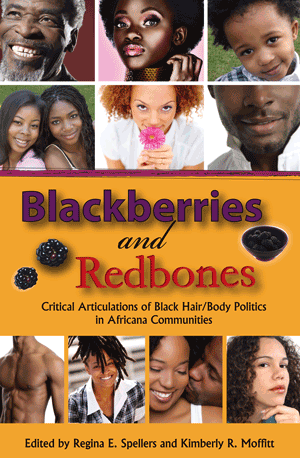Hampton Press
July 2010
484 pages
Paper ISBN: 978-1-57273-881-2
Cloth ISBN: 978-1-57273-880-5
Edited by
Regina E. Spellers, President and CEO
Eagles Soar Consulting, LLC
Kimberly R. Moffitt, Assistant Professor of American Studies
University of Maryland, Baltimore County
This book features engaging scholarly essays, poems and creative writings that all examine the meanings of the Black anatomy in our changing global world. The body, including its hair, is said to be read like a text where readers draw center interpretations based on signs, symbols, and culture. Each chapter in the volume interrogates that notion by addressing the question, “As a text, how are Black bodies and Black hair read and understood in life, art, popular culture, mass media, or cross-cultural interactions?” Utilizing a critical perspective, each contributor articulates how relationships between physical appearance, genetic structure, and political ideologies impact the creativity, expression, and everyday lived experiences of Blackness. In this interdisciplinary volume, discussions are made more complex and move beyond the “straight versus kinky hair” and “light skin versus dark skin” paradigm. Instead efforts are made to emphasize the material consequences associated with the ways in which the Black body is read and (mis)understood. The aptness of this work lies in its ability to provide a meaningful and creative space to analyze body politics—highlighting the complexities surrounding these issues within, between, and outside Africana communities. The book provides a unique opportunity to both celebrate and scrutinize the presentation of Blackness in everyday life, while also encouraging readers to forge ahead with a deeper understanding of these ever-important issues.
Table of Contents
- Foreword, Haki R. Madhubuti
- Introduction, Regina E. Spellers and Kimberly R. Moffitt
- SECTION ONE: Hair/Body Politics as Expression of the Life Cycle
- The Big Girl’s Chair: A Rhetorical Analysis of How Motions for Kids Markets Relaxers to African American Girls, Shauntae Brown White
- Pretty Color ’n Good Hair: Creole Women of New Orleans and the Politics of Identity, Yaba Amgborale Blay
- Invisible Dread: From Twisted: The Dreadlocks Chronicles, Bert Ashe
- Social Constructions of a Black Woman’s Hair: Critical Reflections of a Graying Sistah, Brenda J. Allen
- What it Feels Like for a (Black Gay HIV+) Boy, Chris Bell
- SECTION TWO: Hair/Body as Power
- Dominican Dance Floor, Kiini Ibura Salaam
- Covering Up Fat Upper Arms, Mary L. O’Neal
- Cimmarronas, Ciguapas, and Senoras: Hair, Beauty, and National Identity in the Dominican Republic, Ana-Maurine Lara
- Of Wigs and Weaves, Locks and Fades: A Personal Political Hair Story, Neal A. Lester
- “Scatter the Pigeons”: Baldness and the Performance of Hyper-Black Masculinity, E. Patrick Johnson
- SECTION THREE: Hair/Body in Art and Popular Culture
- From Air Jordan to Jumpman: The Black Male Body as Commodity, Ingrid Banks
- Cool Pose on Wheels: An Exploration of the Disabled Black Male in Film, Kimberly R. Moffitt
- Decoding the Meaning of Tattoos: Cluster Criticism and the Case of Tupac Shakur’s Body Art, Carlos D. Morrison, Josette R. Hutton, and Ulysses Williams, Jr.
- Blacks in White Marble: Interracial Female Subjects in Mid-Nineteenth-Century Neoclassicism, Charmaine Nelson
- Changing Hair/Changing Race: Black Authenticity, Colorblindness, and Hairy Post-ethnic Costumes in “Mixing Nia”, Ralina L. Joseph
- “I’m Real” (Black) When I Wanna Be: Examining J. Lo’s Racial ASSets, Sika Alaine Dagbovie and Zine Magubane
- SECTION FOUR: Celebrations, Innovations, and Applications of Hair/Body Politics
- Diaspora in My Hair: A Poetic Narrative of My Experience in Europe, Nadège Tanite Clitandre
- Broken Mirrors and Reflections of One’s Self: Blackness, Indianness, and Hybridity, Hershini Bhana Young
- Sun Kissed or Sun Cursed?: Exploring Color Consciousness and Black Women’s Tanning Experiences, Regina E. Spellers
- African Men in the United States: Stories of Race, Gender, Sexuality, and Power, Hameed S. (Herukhuti) Williams
- Weaving Messages of Self-Esteem: Empowering Mothers and Daughters through Hair Braiding, Tracey Y. Lewis-Elligan
- SECTION FIVE: Contradictions, Complications, and Complexities of Hair/Body Politics
- Divas to the Dance Floor Please!: A Neo-Black Feminist Readin(g) of Cool Pose, D. Nebi Hilliard
- Coming Out Natural: Dreaded Desire, Sex Roles, and Cornrows, L. H. Stallings
- “I am More than a Victim”: The Slave Woman Stereotype in Antebellum Narratives by Black Men, Ellesia A. Blaque
- Two Warring Ideals, One Dark Body: Hegemony, Duality, and Temporality of the Black Body in African-American Religion, Stephen C. Finley
- The Snake that Bit Medusa: One (Phenotypically) White Woman’s Dreads, Kabira Z. Cadogan
- Author Index
- Subject Index








